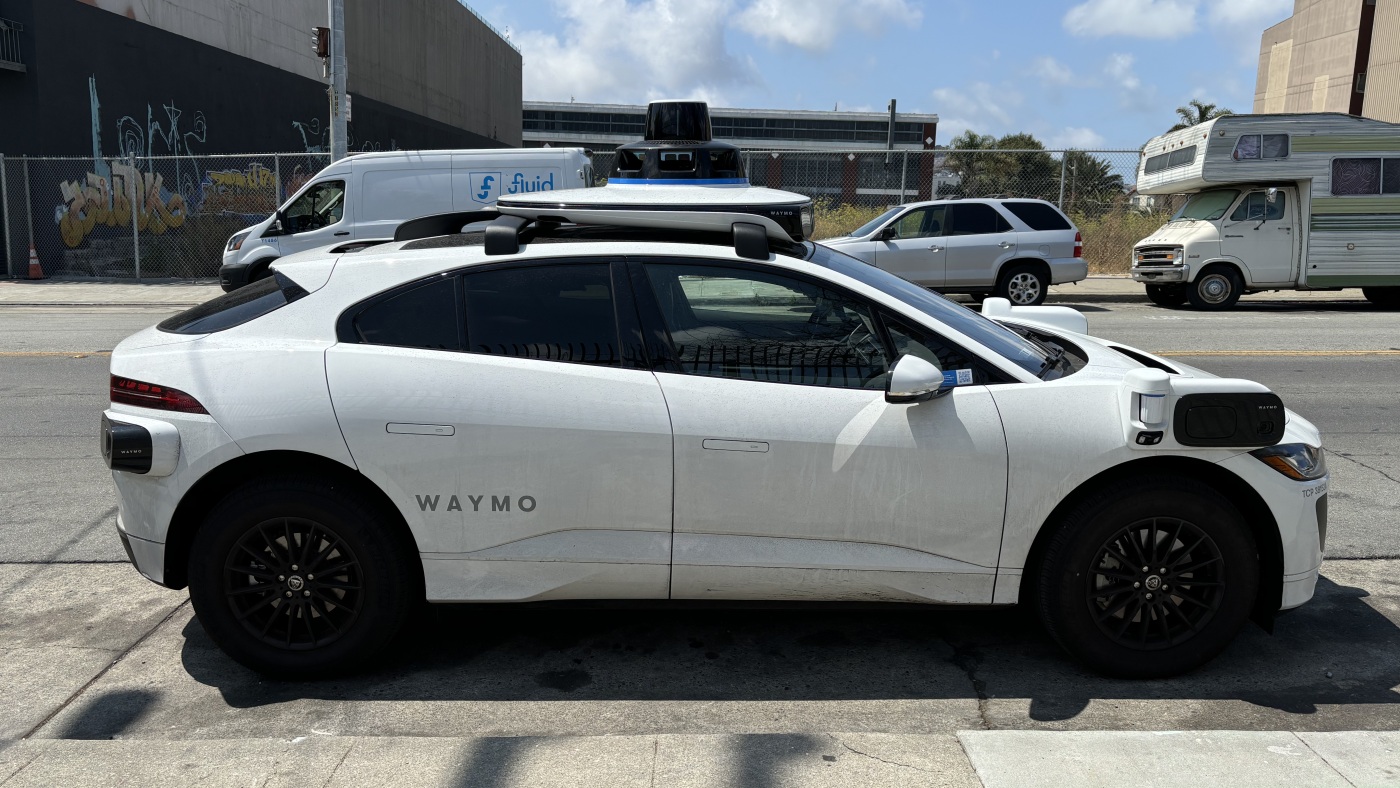Lifestyle
Why does it feel so weird to ride in a driverless car?

Waymo driverless cars are now ubiquitous in San Francisco.
Chloe Veltman/NPR
hide caption
toggle caption
Chloe Veltman/NPR
Dan Avedikian’s recent ride across San Francisco in a driverless car was a mostly uneventful experience.
But at one point, the robotaxi did something the 37-year-old music educator wasn’t expecting: The car signaled as if it were going to turn left at an intersection, but then didn’t.
Avedikian said human drivers often do things like this — make choices that don’t seem to make sense right away.
“Like, big whoop,” he said. “It’s the kind of thing I do all the time.”

But it’s not what he expected from a robot.
“Because the robot should be perfect, right?” he said.
Setting expectations
Alphabet-owned Waymo, one of the most prominent self-driving car companies, recently announced the expansion of its service to Atlanta and Austin early next year. This means many more people are about to see the Silicon Valley company’s vehicles on their city streets. In San Francisco, Waymos are already ubiquitous. But riders can find the experience unsettling, especially when the ride isn’t perfect.
“When we talk about autonomous vehicles, the purported benefit is that it is a better driver than we are,” said Nidhi Kalra, a senior information scientist with the global policy think tank RAND Corporation who studies driverless cars.
She said it’s the driverless car companies themselves that set the public’s high expectations. “Their claim is this is going to be an extraordinary experience,” Karla said. “This is going to be safe. This is going to be easy.”
Waymo’s advertising campaigns feature lines such as, “The Waymo driver will take care of you and keep you safe from Point A to Point B, whether it’s your first ride or your hundredth one.”
Driverless cars do seem to be safer in some situations. A recent study from the University of Central Florida states: “It is anticipated that the automation of systems will significantly reduce the number of accidents, as human errors contribute up to 90% of accidents.”
But the research also shows there’s not enough data to really know: “Despite the recent advancements that Autonomous Vehicles have shown in their potential to improve safety and operation, considering differences between Autonomous Vehicles and Human-Driven Vehicles in accidents remain unidentified due to the scarcity of real-world Autonomous Vehicles accident data.”
A tricky balance
Waymo is trying to strike a tricky balance between the image of seamless machine performance that the company projects and a friendly and familiar experience that earns the public’s trust.
“There are a lot of things that we do that are very human-like,” said Ryan Powell, Waymo’s head of design and customer research.

Powell cites Waymos’ careful negotiations at intersections as one human-like characteristic.
“We might nudge a little bit forward as a way to signal to the other drivers or to the pedestrians that we’re about ready to take that turn,” he said.
There’s also the warm, safety-conscious in-car voice, which reminds passengers to, “Please make sure it’s clear before exiting.”
The human-but-not-quite factor
For some, that disembodied voice is unsettling.
“It’s got this kind of inhuman friendliness,” said New Yorker cartoonist and author Amy Kurzweil. Kurzweil’s work, such as her 2023 graphic memoir Artificial: A Love Story, explores human-machine relationships; in a cartoon for The New Yorker, she poked gentle fun at autonomous vehicles and the people who ride in them.

Amy Kurzweil’s autonomous car cartoon, published in the Apr. 4 2016 issue of The New Yorker.
Amy Kurzweil
hide caption
toggle caption
Amy Kurzweil
Kurzweil said she has taken Waymos a couple of times in San Francisco, and that she enjoys the experience, but she said the uncanny feeling stretches beyond just the voice — for example, the steering wheel spins without anyone sitting behind it.
“That’s triggering our nightmare sense that there should be somebody there, and there isn’t,” she said.
This ghostly echo of the human driver who isn’t there taps into peoples’ deep-seated fears about machines possessing a kind of human consciousness.
“Because we’re often slotting robots into human jobs and human roles, we have this little background nightmare of them as actually having human agency, which they don’t have,” said Kurzweil. “And there is something about the driverless car that is a really good symbol for that anxiety.”

Kurzweil traces the anxiety back to R.U.R — Rossum’s Universal Robots, a 1920 play by Czech writer Karel Čapek. It tells of a deadly uprising of artificial, humanlike beings who were created by humans to do their grunt work. These types of stories keep playing out in our culture, from the awe-inspiring Replicants in the 1982 movie Blade Runner, to last year’s horror film Megan about a scary AI doll.
Kurzweil said she wonders if doing away with the elements we associate with having a human chauffeur might, paradoxically, make riders feel more comfortable.
“If the machine didn’t have a driver’s seat and it didn’t have a steering wheel, it would be less uncanny,” Kurzweil said.
Waymo’s Powell said the company would like to get rid of these things, too. But despite a 2022 regulatory action that paves the way for this possibility, the National Highway Traffic Safety Administration still requires them — for now.
Jennifer Vanasco edited the audio and digital versions of this story; Chloee Weiner mixed the audio.


Lifestyle
The jury's in: You won't miss anything watching this movie from the couch

Nicholas Hoult (front row, center) plays Justin Kemp in Juror #2.
Warner Bros.
hide caption
toggle caption
Warner Bros.
There’s been a bit of consternation flying around about the fact that the theatrical release of Juror #2, directed by Clint Eastwood, was very muted. (It’s now on Max.) It has struck some people, particularly some Eastwood fans, as unfair to give short shrift to the 94-year-old director’s latest work.
But this is a movie that is perfect to watch at home. It belongs at home.
(Some mild early-plot spoilers follow, but they are not important to your enjoyment of the movie.)

The film has a terrific premise: Justin (Nicholas Hoult) gets called for jury duty, which he’s not excited about, since his wife is extremely pregnant and he’d rather just get out of it. But he can’t, and he ends up serving on a case where a man (Gabriel Basso) is accused of beating his girlfriend to death and leaving her by the side of the road after they had a drunken fight at a bar. But Justin quickly realizes that he was at the bar that night, and while he didn’t drink, he was upset. When he left, he took his eyes off the road and hit a deer — or so he thought. Now he wonders: Might he actually have hit this woman himself? And what is he supposed to do now?
The maneuvering that has to happen to make this even mildly plausible is impressive in its precision: He is a recovering alcoholic who went to a bar but didn’t drink, but his sponsor (Kiefer Sutherland) assures him that nobody will believe he was sober and he will rot in jail if he tells the truth. There are both a giant deer-crossing sign and a bridge at the exact point where the incident happened, so that when, in flashbacks, Justin gets out of the car to find out what he hit, he sees the sign, but might just miss the woman’s body, because it may have flown over the side of the bridge.

The legal plot, too, has so many holes in it that it’s more holes than plot itself. As the prosecutor (Toni Collette) prepares to bring the case, nobody thinks that maybe this woman found by the side of the road who left a bar in the dark in the rain was hit by a car, rather than beaten to death with a weapon — of which there’s no sign? (The case against the defendant, her boyfriend, amounts to “we don’t know what happened to her, so she was probably, what? Beaten to death? And it was probably you, since we don’t know anybody else who would have done it.”) Justin’s sponsor (who’s a lawyer!) doesn’t point out that it’s still entirely possible he did hit a deer, given that sign, and that proving otherwise would be a very tall order, especially after they put somebody else on trial?
Suffice it to say that this is a classic hum-through plot, meaning you have to hum loudly to yourself at the silly parts so that you don’t notice how silly they are. But that’s OK! That’s true of many perfectly serviceable courtroom dramas, which is what this is. I miss serviceable courtroom dramas. There should be more of them. And I’ve got nothing against this one, particularly. Clint Eastwood is an experienced and knowledgeable director; you’re not going to suddenly get a bad product. It’s fine!

But the serviceable courtroom drama is a genre that’s well-suited to being watched at home. They could have made this a mid-level Max streaming series, to be honest, dragging it out to six episodes or so, and that would have been fine, too. (Might have given J.K. Simmons, who has a strangely abbreviated role as a fellow juror, more to do.)
It would certainly be nice to see a healthier theater environment, where courtroom dramas could become hits like they could in the olden days (A Few Good Men was the tenth highest-grossing movie of 1993!) The same could be said of sports movies, romantic comedies, adult dramas – I mean, the rest of the domestic top ten of 1993 includes Jurassic Park, The Fugitive, The Firm, Sleepless in Seattle, Mrs. Doubtfire, Indecent Proposal, In the Line of Fire, Aladdin and Cliffhanger. This year’s domestic top 10 (thus far) is nine sequels and Wicked. That’s a bummer.

But that’s happening across the board. Clint Eastwood was not singled out for disrespect; the couch is just where people see regular movies now. And if viewing is going to shift toward home, this film, which is thoroughly and entirely OK, belongs there as much as any.
This piece also appeared in NPR’s Pop Culture Happy Hour newsletter. Sign up for the newsletter so you don’t miss the next one, plus get weekly recommendations about what’s making us happy.
Listen to Pop Culture Happy Hour on Apple Podcasts and Spotify.
Lifestyle
No turf wars, no sexism: Meet the queer Gen Z women giving billiards a rebrand in L.A.

In the summer of 2023, Alix Max, new to town with a cigarette in their mouth, was shooting pool on the patio of 4100 Bar in Silver Lake. They were pretty good, too — good enough to catch the eye of two regulars, Andrea Lorell and Julianne Fox, who recruited them to join their practice group. Their proposal was simple: “We have this group chat, and we play together and get better. The goal is to beat men at pool.”
It’s a plotline that could be lifted from the classic billiards film “The Hustler”: an up-and-coming pool prodigy, James Dean-cool, comes to town and gets seduced by the green-felted world of dive bar pool — an aspiring pool shark meet-cute over an ashtray. A cherished motto Max introduced to the group: “Pool is blue-collar golf.”
The pool night was born after Andrea Lorell, pictured, and other players kept experiencing hostility around the sport at other bars.
(Robert Gauthier / Los Angeles Times)
The pool-playing group, which started as a group chat titled “Women in STEM,” was composed of pool amateurs, usually young women Julianne “drunkenly met” at 4100 Bar who had a burgeoning interest in pool. Soon, the group chat mutated into a tournament series and community titled “Please Be Nice.” If billiards has the reputation of being a pastime for gamblers, hustlers and hanger-oners, the female-centric biweekly pool tournament at 4100 Bar offers a friendly, supportive alternative. “I don’t know if the goal necessarily was to build community, but it was a natural byproduct,” says Fox. The tournament is both a party and competition where women practice pool, trade tips and compete in an encouraging environment. It was created as an antidote to the prickly, male-dominated world of dive bar pool — all the exhilaration without the bickering turf wars with bar regulars.

Julianne Fox tallies the score.
(Robert Gauthier / Los Angeles Times)
The founders, Lorell and Fox, began shooting pool at 4100 Bar in April 2023 and were bonded by their mutual hunger for the game. Growing up as an only child, Lorell spent hours playing on her aunt’s pool table. As an adult, she traveled across the country for work, always seeking out pool halls to “find a good hang.” She’s since joined a league and even played in a tournament in Las Vegas, where her team won the Sportsmanship Award. The team that knocked her out was disqualified in the next round. On the patio, she details the melodrama so amusingly that her love for the game is infectious — almost romantic.

“It’s a community cheering for each other and seeing each other get good,” says co-founder Andrea Lorell.
(Robert Gauthier / Los Angeles Times)
Until recently, Lorell lived in a cluttered studio apartment with a pool table beside her bed. She jokes being a pool shark is her dream job. “I give myself a little pep talk before important matches: ‘You’re the greatest pool player in the world,’” she says, laughing with a cigarette in hand. For her, the intention of “Please Be Nice” is to make pool accessible to young women: “It’s a community cheering for each other and seeing each other get good. It expedites people’s learning.”
Julianne Fox, a co-founder, says the tournament also operates as a workshop: “If you’ve never shot a pool ball before, come through. We’ll metaphorically or literally hold your hand.” It’s not about showing up the boys, even if that still happens. “I think it’s even more fun to learn the game to play with your girls,” says Fox. “I want to win, but I also want my opponent to have fun,” she adds, emphasizing the competition’s good-natured energy.
Pool tables in Los Angeles can be hostile places. “I’ll walk into a random bar in Koreatown, and there’s a pool table, and a bunch of older men are playing. You walk in, and they assume you’ll be bad at it,” says Max.
Adds Lorell, “They’re either giving you tips or checking you out, so it’s uncomfortable.”

Players say there’s a good-natured energy at “Please Be Nice” tournaments.
(Robert Gauthier / Los Angeles Times)
Molly Sievert, another “Please Be Nice” player, has also experienced sexism while playing pool. She explains that people assume her interest in pool stems from wanting to impress a father or boyfriend. She began shooting pool at 21 in bars across cities and is still baffled by men’s casual condescension toward female pool players. ”Men have never complimented me on my defensive shots because they think it’s an accident,” she says. When they inevitably lose to Sievert, they toss it up to a bad beat rather than their opponent’s skillset. She won her first tournament at “Please Be Nice” and has been a frequent competitor ever since. She’s a proud critic of 4100 Bar regulars — she says people keep walking into her cue stick, throwing off her shots, and not apologizing. “I always have that little part of me that is like, would you do that to a man?”
Sievert explains a personal theory that women take naturally to pool. Above all, it’s a game of brokering one’s circumstances, calling one’s shot, and making one’s own luck. It’s the type of hazards and presentiment that feel inherent to womanhood. Bravado, Molly argues, doesn’t serve the game. “Men will say, ‘I can make shots. I’m a shot maker.’ Many women are like, ‘I like the side pockets and weird angles. I don’t like the long table shots. I don’t like hitting it real. I like to think about the interaction of all the balls.”
April Clark, a comedian and pool player, chalks up antagonism at pool tables in L.A. to a scarcity issue. “When I first got sucked into playing pool, I was living in New York City; there were so many bars with pool tables.” For Clark, the game’s appeal is the spontaneous encounters with strangers that pool invites. The fewer the tables, the worse the ecosystem, the worse the vibe, Clark argues.

Jaden Levinson, left, and Taylor Garcia watch the action.
(Robert Gauthier / Los Angeles Times)
It is often remarked that pool halls look like morgues; the dimly lit blue-felted table inside 4100 Bar is no exception. The competitors are in a trancelike state, building a stratagem. The pool tournaments often run till the bar closes at 2 a.m. The players take breaks to socialize, buy drinks and watch each other play.
Part of the success of “Please Be Nice” is tied to the recent renaissance of 4100 Bar, which transformed from a neighborhood dive into a Silver Lake nightlife institution thanks to TikTok. Mouse, a bartender at 4100 Bar for eight years, explains the bar’s rise began in 2020 when it became a popular spot for outdoor drinking during COVID restrictions.

Participants of all levels are welcome — even those who’ve never shot a pool ball before.
(Robert Gauthier / Los Angeles Times)
Now, it’s not unusual to have a run-in with a celebrity at 4100 Bar on a weekend with its new reputation as a charmingly sleazy playground for the internet-famous. Due to TikTok, the bar gained a cult following in Europe and Japan, with tourists flocking to the bar to be photographed in front of the avocado-green wall, Mouse explains. “Foreigners come here just to take photos with the 4100 sign and won’t even order,” he says. “People come and spend 100 bucks on the photo booth and not even get a drink.” The wall, he notes, closely resembled the now-infamous shade of neon green from Charli XCX’s “Brat” album.
For Lorell, the dive bar exists as a third space. “If you spend four out of seven days seeing the same people, you’re not just bar friends on that point; you’re chosen family.”

Diana Brennan sizes up the playing field.
(Robert Gauthier / Los Angeles Times)
Rumors swirl that 4100 Bar might close in the coming year with the expansion of Erewhon. “Over my dead body,” Fox exclaims.
For the future of “Please Be Nice,” Lorell and Fox hope the pool-loving community develops even further. “We would love to solidify a beginner-centric event since that’s where this all started, learning pool with women and nonbinary people who were too scared to try it at a normal bar,” says Fox. “We hope to continue to train up the troops and run every single table in L.A.,” she adds with a smirk.
There’s a beloved pool adage from “The Hustler,” spoken by the protagonist, Fast Eddie Felson: “Even if you beat me, I’m still the best.” Fox thinks the quote doesn’t align with her attitude toward pool. “There’s something Andrea says all the time when someone beats her, she says: ‘I don’t lose to losers. So you better win the whole thing.’”
Lifestyle
Is “The Godfather: Part II,” the perfect sequel? : Consider This from NPR

The “Kiss of Death” in “The Godfather: Part II”, directed by Francis Ford Coppola, based on the novel ‘The Godfather’ by Mario Puzo. Seen here from left, John Cazale (back to camera) as Fredo Corleone and Al Pacino as Don Michael Corleone.
Photo by CBS via Getty Images
hide caption
toggle caption
Photo by CBS via Getty Images

The “Kiss of Death” in “The Godfather: Part II”, directed by Francis Ford Coppola, based on the novel ‘The Godfather’ by Mario Puzo. Seen here from left, John Cazale (back to camera) as Fredo Corleone and Al Pacino as Don Michael Corleone.
Photo by CBS via Getty Images
Given the fact that it seems like Hollywood churns out nothing but sequels, you would think the industry would have perfected the genre by now.
Some sequels are pretty darn good, but many believe the perfect movie sequel came out 50 years ago this month.
Of course, we’re talking about Francis Ford Coppola’s The Godfather: Part II. It’s not only considered the greatest sequel of all time, it’s also considered one of the greatest movies of all time.
So why does Godfather II work, and where so many other sequels fall short?
NPR producer Marc Rivers weighs in.
For sponsor-free episodes of Consider This, sign up for Consider This+ via Apple Podcasts or at plus.npr.org.
Email us at considerthis@npr.org.
This episode was produced by Brianna Scott and Marc Rivers. It was edited by Courtney Dorning. Our executive producer is Sami Yenigun.
-

 Politics1 week ago
Politics1 week agoCanadian premier threatens to cut off energy imports to US if Trump imposes tariff on country
-
/cdn.vox-cdn.com/uploads/chorus_asset/file/25782636/247422_ChatGPT_anniversary_CVirginia.jpg)
/cdn.vox-cdn.com/uploads/chorus_asset/file/25782636/247422_ChatGPT_anniversary_CVirginia.jpg) Technology1 week ago
Technology1 week agoInside the launch — and future — of ChatGPT
-
/cdn.vox-cdn.com/uploads/chorus_asset/file/25789444/1258459915.jpg)
/cdn.vox-cdn.com/uploads/chorus_asset/file/25789444/1258459915.jpg) Technology1 week ago
Technology1 week agoOpenAI cofounder Ilya Sutskever says the way AI is built is about to change
-

 Politics1 week ago
Politics1 week agoU.S. Supreme Court will decide if oil industry may sue to block California's zero-emissions goal
-
/cdn.vox-cdn.com/uploads/chorus_asset/file/25546252/STK169_Mark_Zuckerburg_CVIRGINIA_D.jpg)
/cdn.vox-cdn.com/uploads/chorus_asset/file/25546252/STK169_Mark_Zuckerburg_CVIRGINIA_D.jpg) Technology1 week ago
Technology1 week agoMeta asks the US government to block OpenAI’s switch to a for-profit
-

 Politics1 week ago
Politics1 week agoConservative group debuts major ad buy in key senators' states as 'soft appeal' for Hegseth, Gabbard, Patel
-

 Business6 days ago
Business6 days agoFreddie Freeman's World Series walk-off grand slam baseball sells at auction for $1.56 million
-
/cdn.vox-cdn.com/uploads/chorus_asset/file/23951353/STK043_VRG_Illo_N_Barclay_3_Meta.jpg)
/cdn.vox-cdn.com/uploads/chorus_asset/file/23951353/STK043_VRG_Illo_N_Barclay_3_Meta.jpg) Technology6 days ago
Technology6 days agoMeta’s Instagram boss: who posted something matters more in the AI age
















